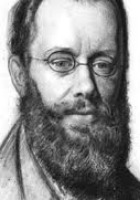The Courtship Of The Yonghy-Bonghy-Bo Poem by Edward Lear
The Courtship Of The Yonghy-Bonghy-Bo
I
On the Coast of Coromandel
Where the early pumpkins blow,
In the middle of the woods
Lived the Yonghy-Bonghy-Bò.
Two old chairs, and half a candle,--
One old jug without a handle,--
These were all his worldly goods:
In the middle of the woods,
These were all the worldly goods,
Of the Yonghy-Bonghy-Bò,
Of the Yonghy-Bonghy-Bò.
II
Once, among the Bong-trees walking
Where the early pumpkins blow,
To a little heap of stones
Came the Yonghy-Bonghy-Bò.
There he heard a Lady talking,
To some milk-white Hens of Dorking,--
''Tis the lady Jingly Jones!
'On that little heap of stones
'Sits the Lady Jingly Jones!'
Said the Yonghy-Bonghy-Bò,
Said the Yonghy-Bonghy-Bò.
III
'Lady Jingly! Lady Jingly!
'Sitting where the pumpkins blow,
'Will you come and be my wife?'
Said the Yonghy-Bonghy-Bò.
'I am tired of living singly,--
'On this coast so wild and shingly,--
'I'm a-weary of my life:
'If you'll come and be my wife,
'Quite serene would be my life!'--
Said the Yonghy-Bonghy-Bò,
Said the Yonghy-Bonghy-Bò.
IV
'On this Coast of Coromandel,
'Shrimps and watercresses grow,
'Prawns are plentiful and cheap,'
Said the Yonghy-Bonghy-Bò.
'You shall have my chairs and candle,
'And my jug without a handle!--
'Gaze upon the rolling deep
('Fish is plentiful and cheap)
'As the sea, my love is deep!'
Said the Yonghy-Bonghy-Bò,
Said the Yonghy-Bonghy-Bò.
V
Lady Jingly answered sadly,
And her tears began to flow,--
'Your proposal comes too late,
'Mr. Yonghy-Bonghy-Bò!
'I would be your wife most gladly!'
(Here she twirled her fingers madly,)
'But in England I've a mate!
'Yes! you've asked me far too late,
'For in England I've a mate,
'Mr. Yonghy-Bonghy-Bò!
'Mr. Yonghy-Bonghy-Bò!'
VI
'Mr. Jones -- (his name is Handel,--
'Handel Jones, Esquire, & Co.)
'Dorking fowls delights to send,
'Mr. Yonghy-Bonghy-Bò!
'Keep, oh! keep your chairs and candle,
'And your jug without a handle,--
'I can merely be your friend!
'-- Should my Jones more Dorkings send,
'I will give you three, my friend!
'Mr. Yonghy-Bonghy-Bò!
'Mr. Yonghy-Bonghy-Bò!'
VII
'Though you've such a tiny body,
'And your head so large doth grow,--
'Though your hat may blow away,
'Mr. Yonghy-Bonghy-Bò!
'Though you're such a Hoddy Doddy--
'Yet a wish that I could modi-
'fy the words I needs must say!
'Will you please to go away?
'That is all I have to say--
'Mr. Yonghy-Bonghy-Bò!
'Mr. Yonghy-Bonghy-Bò!'.
VIII
Down the slippery slopes of Myrtle,
Where the early pumpkins blow,
To the calm and silent sea
Fled the Yonghy-Bonghy-Bò.
There, beyond the Bay of Gurtle,
Lay a large and lively Turtle,--
'You're the Cove,' he said, 'for me
'On your back beyond the sea,
'Turtle, you shall carry me!'
Said the Yonghy-Bonghy-Bò,
Said the Yonghy-Bonghy-Bò.
IX
Through the silent-roaring ocean
Did the Turtle swiftly go;
Holding fast upon his shell
Rode the Yonghy-Bonghy-Bò.
With a sad primæval motion
Towards the sunset isles of Boshen
Still the Turtle bore him well.
Holding fast upon his shell,
'Lady Jingly Jones, farewell!'
Sang the Yonghy-Bonghy-Bò,
Sang the Yonghy-Bonghy-Bò.
X
From the Coast of Coromandel,
Did that Lady never go;
On that heap of stones she mourns
For the Yonghy-Bonghy-Bò.
On that Coast of Coromandel,
In his jug without a handle
Still she weeps, and daily moans;
On that little hep of stones
To her Dorking Hens she moans,
For the Yonghy-Bonghy-Bò,
For the Yonghy-Bonghy-Bò.
This poem has not been translated into any other language yet.
I would like to translate this poem
Although this is a 'nonsense' poem, and a humorous poem, it is also one of the saddest poems I have ever read. Edward Lear shows his true brilliance here by crafting an ostensibly nonsensical story which says a lot about human nature and relationships, particularly the way people value material goods over true affection, at least until they become aware of what they have lost.